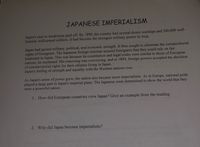Question
PLEASEE WRITE THE ANSWER IN 1 TO TWO SENTENCES AND PLEASE DO NOT WRITE ANYTHING ELSE OTHER THAN THE ANSWER

Transcribed Image Text:JAPANESE IMPERIALISM
Japan's race to modernize paid off. By 1890, the country had several dozen warships and 500,000 well-
trained, well-armed soldiers. It had become the strongest military power in Asia.
Japan had gained military, political, and economic strength. It then sought to eliminate the extraterritorial
rights of foreigners. The Japanese foreign minister assured foreigners that they could rely on fair
treatment in Japan. This was because its constitution and legal codes were similar to those of European
nations, he explained. His reasoning was convincing, and in 1894, foreign powers accepted the abolition
of extraterritorial rights for their citizens living in Japan.
Japan's feeling of strength and equality with the Western nations rose.
As Japan's sense of power grew, the nation also became more imperialistic. As in Europe, national pride
played a large part in Japan's imperial plans. The Japanese were determined to show the world that they
were a powerful nation.
1. How did European countries view Japan? Give an example from the reading.
2. Why did Japan become imperialistic?
Expert Solution
This question has been solved!
Explore an expertly crafted, step-by-step solution for a thorough understanding of key concepts.
This is a popular solution
Trending nowThis is a popular solution!
Step by stepSolved in 2 steps
